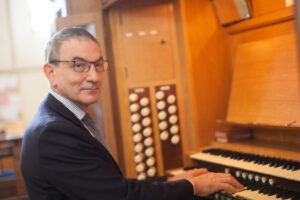As well as its day-to-day role in the life of the church, the new organ will be a vital resource for the St Giles’ Music Academy.
Our Music Academy offers organ tuition at all levels, including diplomas. Students are welcome to attend for occasional or regular lessons. Guidance is available in service playing, repertoire, organ history, technique, and keyboard skills. All students are guaranteed high quality teaching tailored to an agreed programme of study.
 St Giles’ recruits and nurtures the next generation of young musicians. We encourage musical children to become the accomplished musicians of the future: ones able to recruit singers; ones able to administer, conduct and inspire choirs; ones able to teach, to perform concerts, and to exhibit a whole host of other skills.
St Giles’ recruits and nurtures the next generation of young musicians. We encourage musical children to become the accomplished musicians of the future: ones able to recruit singers; ones able to administer, conduct and inspire choirs; ones able to teach, to perform concerts, and to exhibit a whole host of other skills.
 We work in partnership with young people and educators in local schools to ensure these extensive opportunities are available to all. At present, 7 of our young organ students hold scholarships funded by the Young Organ Scholar Trust. An outreach programme is being developed with local schools to promote organ studies, with one organ already installed in a local state school.
We work in partnership with young people and educators in local schools to ensure these extensive opportunities are available to all. At present, 7 of our young organ students hold scholarships funded by the Young Organ Scholar Trust. An outreach programme is being developed with local schools to promote organ studies, with one organ already installed in a local state school.
Did you know…
 With a documented history dating back at least a thousand years, the organ has caught the attention of journalists, saints, musicians, poets, theologians, and painters, and many others, inviting diverse interpretations. Mozart honoured the instrument with the title, ‘King of Instruments’. The instrument’s mechanics and engineering were considered to display a culture’s ingenuity and carry political overtones. For example, in 757 a gift from Constantine V, termed ‘organum’, was sent to the Carolingian court, perhaps to show Byzantium’s cultural-technological advances.
With a documented history dating back at least a thousand years, the organ has caught the attention of journalists, saints, musicians, poets, theologians, and painters, and many others, inviting diverse interpretations. Mozart honoured the instrument with the title, ‘King of Instruments’. The instrument’s mechanics and engineering were considered to display a culture’s ingenuity and carry political overtones. For example, in 757 a gift from Constantine V, termed ‘organum’, was sent to the Carolingian court, perhaps to show Byzantium’s cultural-technological advances.
The organ was for a long period and in many places in Northern Europe regarded as contentious because of its association with Catholic forms of worship. During the Civil War, on 9 May 1644 Parliament enacted that ‘all Organs and the Frames or Cases wherein they stand […] shall be taken away and utterly defaced, and none hereafter set up in their places’. Thus at Westminster Abbey, Cromwell’s soldiers ‘pawned the pipes at several alehouses for pots of ale’; at Peterborough a regiment threw the organ to the ground, ‘where they stamped and trampled it to pieces in a strange, furious and frantic zeal’. In eighteenth-century Protestant Germany, on the other hand, J.S. Bach wrote some of the finest works in the organ repertoire. Eventually in England the High Church movement in the nineteenth century brought back organs and choirs into parish worship and encouraged fresh works to be composed.
Few instruments can claim a status which enables them to be praised or mercilessly attacked as a result of storms of contention. Organ history is fascinating. But so is learning to play this instrument which comes in many different shapes and sizes! There is a vast literature of musical works: from J S Bach’s adventurous harmonies, to Ecclesiastical Tangos, to Hungarian Rock.



